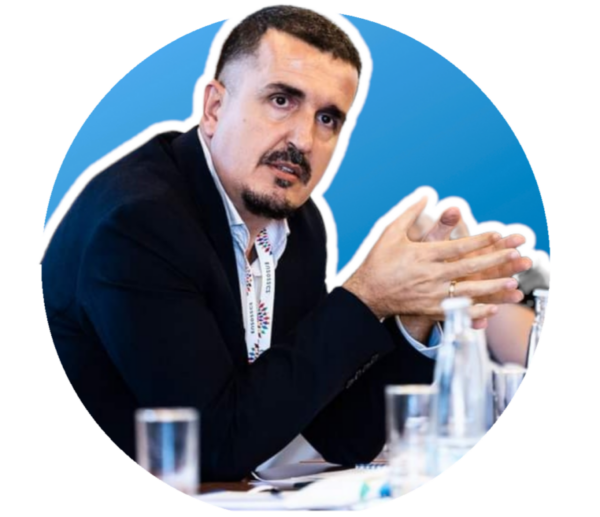In these meetings, in fact, there is no general interest. There are only photographs, pathetic folklorism, populism and propaganda. It is a golden opportunity, especially for Rama, to present himself in the role of a regional statesman, who in Skopje shares lectures on how to change the Constitution to move forward towards European integration, while in Albania he thinks about how to legalize money dirty through fiscal amnesty.
Author: Xhelal Neziri
The Prime Minister of Albania, Edi Rama, assembled his entire governing cabinet and landed in Skopje on October 14. He came to hold the joint meeting of the two governments, the second in a row after the one held in 2017. Just like the first, this second one was also accompanied by protocols and ceremonies and produced a total of 21 new agreements and memoranda.
Since the establishment of diplomatic relations between North Macedonia and Albania in 1993, a total of 37 agreements have been signed, which require ratification in the respective parliaments. With these agreements, which after ratification oblige the states to implement them, a number of issues in the interest of citizens from both countries have been regulated – from crossing the border with ID cards to access to European integration. All these important agreements were signed before 2013, that is, before Rama came to head the Albanian government. In his time, only three ratified agreements were signed: for social insurance (2016), for cooperation in the field of education and science (2016) and the agreement for the establishment of mutual cultural centers (2019).
On the other hand, there are a total of 41 memorandums, protocols and agreements that are not subject to ratification, which have been signed since 1993, but whose implementation is at the discretion of the institutions of the respective countries. Such are the 5 documents signed at the first joint meeting between the government of Skopje and Tirana, held on December 15 in Pogradec, Albania. If we add to this number the 21 documents signed on October 14 in Skopje, which are also not subject to ratification, then their number reaches 62.
If both meetings produced signatures of non-binding documents for the parties, which are forgotten immediately after they are signed, then where is the concrete interest of citizens from these types of meetings? In these meetings, in fact, there is no general interest. There are only photographs, pathetic folklorism, populism and propaganda. It is a golden opportunity, especially for Rama, to present himself in the role of a regional statesman, who in Skopje shares lectures on how to change the Constitution to move forward towards European integration, while in Albania he thinks about how to legalize money dirty through fiscal amnesty. In Skopje, he talks about the democratization of the region through the “Open Balkans” project, while Albania continues to receive criticism for the worsening situation with media freedom. In Skopje, he talks about the European values that we in the region supposedly share, but Transparency International ranks Albania in 110th place, together with Bosnia and Herzegovina, as countries with the greatest presence of corruption in the Balkans. Not only in Skopje, everywhere outside Albania he speaks with sophistry, with ready-made and beautiful sentences, which resemble poems, but which are basically empty populism.
In the press conference with his Macedonian counterpart, Dimitar Kovacevski, Rama also emphasized the importance of the Open Balkans initiative. Three days after the two traveled to Belgrade for the next summit of this initiative. Founded in 2019 in Novi Sad by Serbian President Aleksandar Vučić, Rama and former Macedonian Prime Minister Zaev, the Open Balkans seems to have failed to achieve any of its main goals: it has not fulfilled the inclusive principle, as it has yet to convince three the other states of the Western Balkans to join, while almost none of the four European movements have secured it. The influx of emigrants in the summer and their long waits at the borders of the region denied all the documents signed with pomposity at the previous summits of this initiative. The green lines for the movement of goods at the border crossings have only signs, but are essentially non-functional. Almost no agreement has given the expected results, which were in the interest of the citizens of the region.
Like joint meetings between governments, which produce documents that are not respected, the Open Balkans seems to serve only as a stage for propaganda parades. Already when German Chancellor Olaf Scholz, as Merkel’s successor, gathered the leaders of the Western Balkans in Berlin to let them know that the Berlin Process continues more strongly and with more development funds, the Open Balkans appears as a half-hearted initiative, pale, without results and which only serves to satisfy the ambitions for regional prominence of the Rama-Vučić duo.
If a political action is evaluated by the results it gives, then the Berlin Process turns out to be the only initiative that has produced benefits for citizens. In addition to the inclusion of the six Balkan states as equals, this initiative produces documents subject to ratification, which then produce conversations without roaming, the promotion of cooperation between young people, concrete projects in different fields, joint management of the pandemic, of the crisis energy, recognition of diplomas, permits, etc. Therefore, it must be said publicly that the Open Balkans and joint intergovernmental meetings are only propaganda activities, for internal political purposes, from which the citizens have no benefit.

